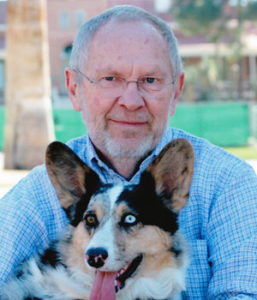
INTRODUCING ROBERT B. FLEMING, CELA
Robert Fleming, CELA was practicing elder law even before it was called “elder law.” His tips for success include carrying yourself with purpose, staying curious and humble on the job, and even bluffing a little bit when you need to. You’ll get better acquainted with Robert (one of the founders of the Special Needs Alliance), principal at Fleming & Curti, Tucson, Ariz., and his colorful storytelling skills in this dialogue with SNA.
From a young age, I knew with certainty what I would be when I grew up. I planned on studying chemistry and probably teaching chemistry at the college or high school level. Then in college I found out that one had to, well, practice chemistry to get a degree in the area. So, I switched.
When I figured out I wanted to go to law school, I knew with certainty what I would do. I would become a law librarian, and I had even picked out the law school that had a specialized law library curriculum. I even got accepted to that law school. Unfortunately, I visited another school I had gotten into—the University of Arizona—and that plan evaporated (the pun is more meaningful if you know that the first school was the University of Washington). In law school I knew with certainty what I would do. I would practice environmental law (or, perhaps, mining and water law–the next best thing). That’s what I focused on.
Then life intervened. I had to actually make a living, and there weren’t many people hiring environmental, water, or mining law attorneys. So, I gravitated to guardianship and conservatorship (there wasn’t then an area called “elder law” or “special needs law”). I became the county’s public fiduciary–-a full-time position with a staff of 24. I loved it. Arizona adopted Medicaid (we were the last state to do so) while I was working for the county, so I got a thorough and free education in public benefits. And then a local toxic tort case came up, and suddenly someone needed to create a half dozen special needs trusts for claimants with substantial settlements. That was 1986, and I have been coasting on that experience now for 35 years.
What keeps me interested in this legal niche is the powerful ability to help real people with manageable problems, though very often they do not see any way through the thickets. That is the beauty and attraction of this practice. What an opportunity to make a living while helping others, many of them in such tough spots that many of us would be eager to help even if we didn’t get paid for the work. Several years ago, SNA member Steve Dale told two beautiful stories about the practice area, which spoke to me at the time: https://elder- law.com/why-we-do-what-we-do/
Attach yourself to a mentor, and ingratiate yourself with her or him. Approach the practice area with curiosity and humility. No matter how much you think you already know about special needs, there is a lot still to be learned (true for people of my age as well). You’ve had some extraordinary and unique experiences and life lessons. Any random group of people ten or 20 years older than you have had far, far more. And an organization like the Special Needs Alliance is chock-full of people with extraordinary experiences. And they all want to tell you about them.
I got in trouble in the sixth grade when my teacher asked us “who was the greatest person ever to live?” I hesitatingly raised my hand and offered “Albert Einstein?” That wasn’t the answer he was looking for (you can probably figure out the “correct” answer if I tell you I was raised in rural Utah). But I’m still hooked on Albert Einstein.
I’ve recently read a lot about James A. Garfield and Chester A. Arthur. The former was a model of probity, energy, and imagination. The latter was a political hack who redeemed himself in the name of his fallen leader. Both had admirable traits, it seems to me.
Perhaps because I’m now thinking politically, or because I grew up as such an outsider (as a non-Mormon in Utah), but my mind gravitates to Barack Obama. OK – also Michelle. I’d love to have half the grace, intelligence, and dignity of either one of them.
Leona McCarrey, my fifth grade teacher, once saw me as I walked into the school building. “Bruce Fleming,” she said (I went by Bruce until I left Utah), “I saw you walking toward school this morning, and you were dawdling. You need to always look like you have someplace to go, even if you don’t.” That has stuck with me.
In a more academic vein, in law school I learned that everyone else is as anxious and as uncertain as you are about your understanding of complex issues. If you act like you know what you’re talking about (or, for that matter, whether you have someplace to go), you can fool a lot of people.
You know, I’m not much in favor of maintaining a bucket list. It implies that the only reason you continue to live is to accomplish a set of pre-established goals, or that if you managed to get them all done you might just as well die, or if you don’t get them all done you’re a failure. Instead, I’ll stick with “I hope to travel, to drink some really fine wines, and to chat in casual settings with some really interesting people. And I aspire to do all of those things regularly.”
